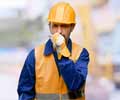Physically or sexually abused kids are at a significantly higher risk of having asthma, according to a new study.
The study, which was conducted on urban children in Puerto Rico, showed that kids who face physical or sexual abuse are more than twice as likely to have asthma as their peers.In fact, physical and sexual abuse was second only to maternal asthma in all the risk factors tested, including paternal asthma and indicators of socioeconomic status.
"To our knowledge, this is the first report of a direct association between childhood abuse and asthma and asthma-related outcomes," wrote Robyn T. Cohen, M.D., M.P.H., lead author of the paper of the Channing Laboratory of Brigham and Women's Hospital in Boston.
The article was published in the first issue for September of the American Journal of Respiratory and Critical Care Medicine, a publication of the American Thoracic Society.
"We wanted to explore whether exposure to stress and violence is associated with an increased risk of asthma in urban children living in Puerto Rico," said principal investigator, Juan C. Celedon, M.D., Dr.P.H.
"We already know that there is a high prevalence of asthma in Puerto Rican children, and many studies have linked stress and exposure to violence to health problems in childhood, including asthma," Juan added.
The researchers interviewed 1,353 parent-child pairs in between 2001 and 2003, and re-interviewed nearly 90 percent of the same pairs two years after their initial interviews.
hey used validated questionnaires to elicit information about stress and violence in the children's lives (whenever possible, without the parent present), and used doctor-diagnosed asthma, allergic rhinitis, use of prescription medication for asthma and physician visits for asthma and/or allergic rhinitis within the previous year to assess the children's asthma/allergy status.
"Children with a history of abuse had higher frequencies of all outcomes of interest than those without a history of abuse. After adjusting for relevant covariates, history of abuse was associated with an approximate doubling of the odds of current asthma, healthcare use for asthma, and allergic rhinitis," stated Dr. Cohen.
The study did not, however, find a link between neighbourhood violence and asthma, as other studies have done in the past.
The researchers suggest that the discrepancy may be the result of the fact that "it is not simply the exposure to a particular stressor but the physiological response to that stressor that predicts physical health outcomes."
Source-ANI
SRM














